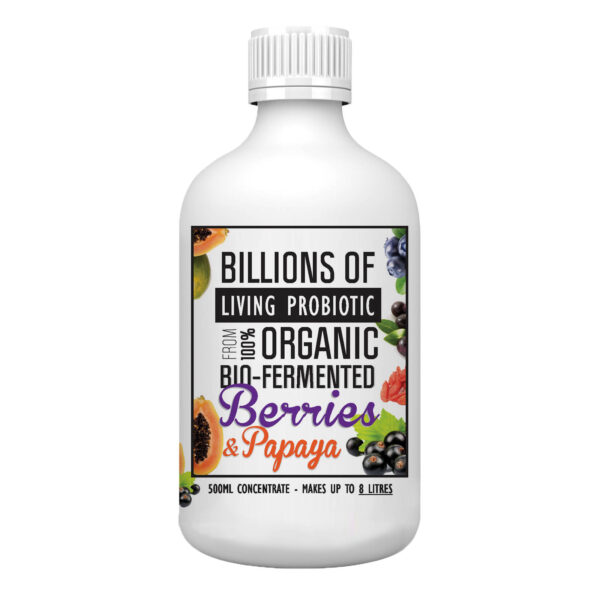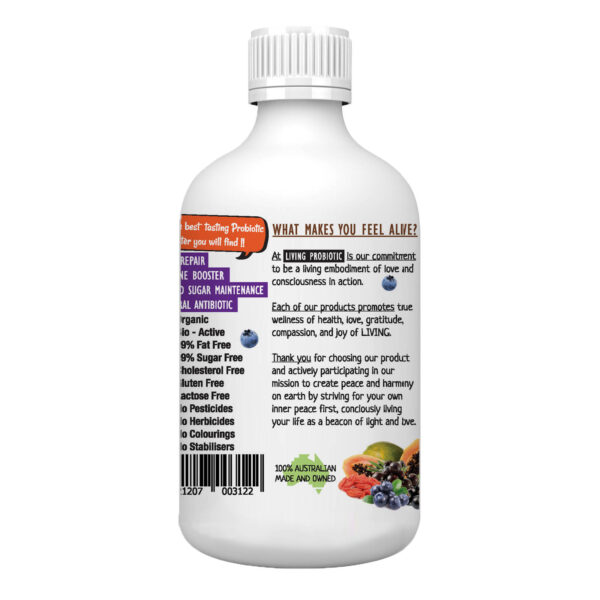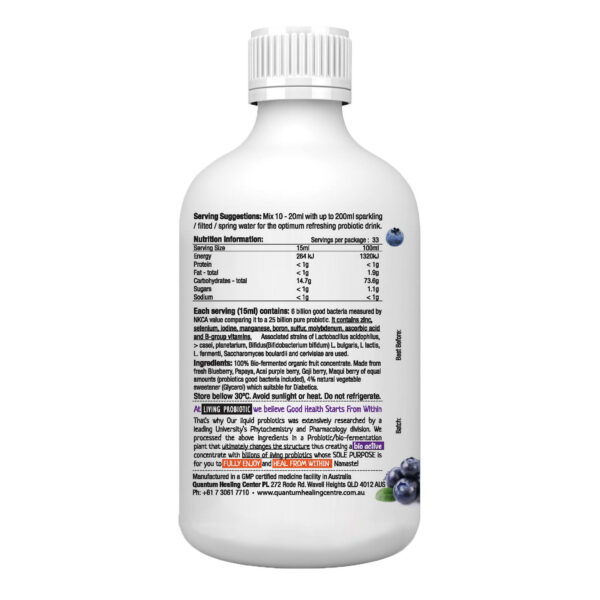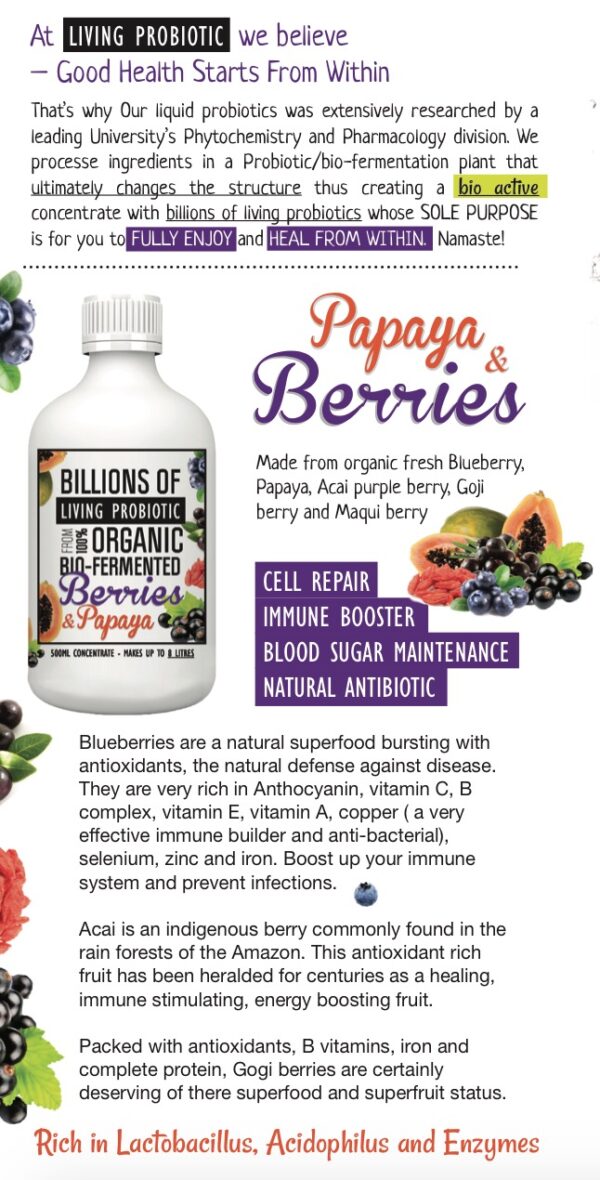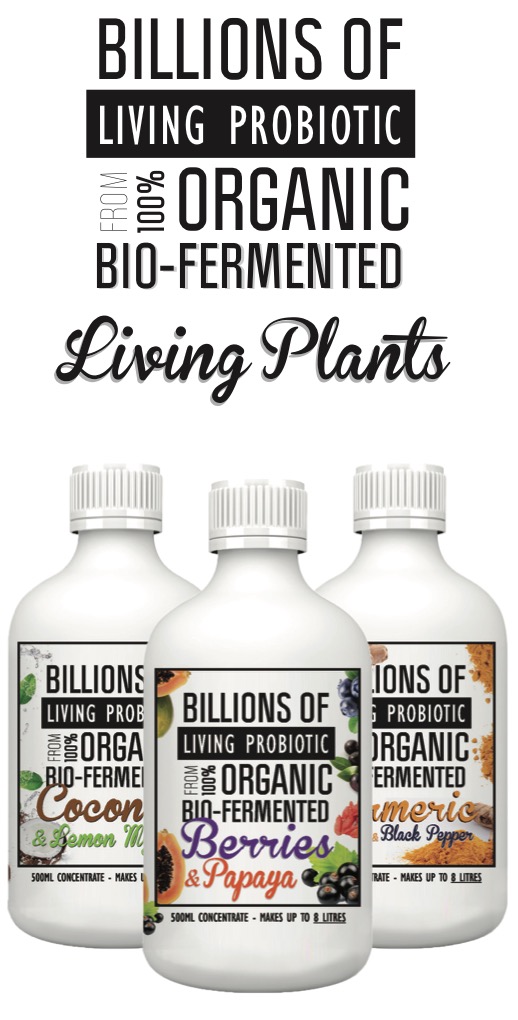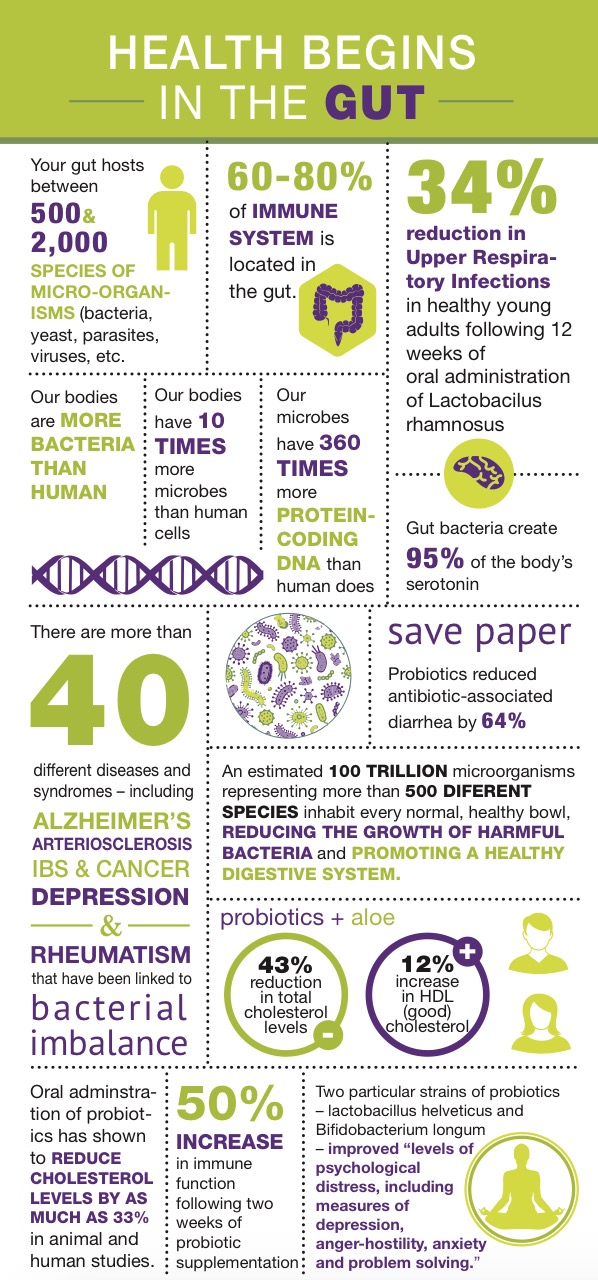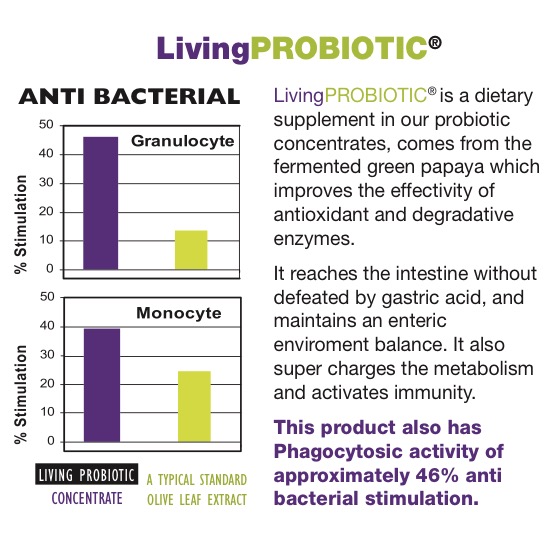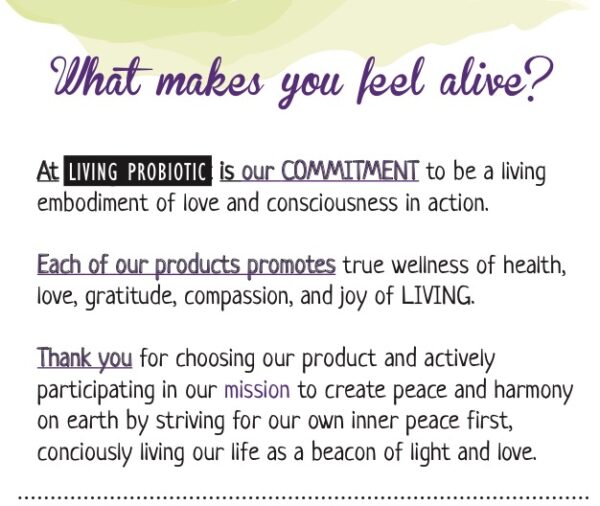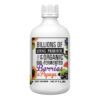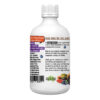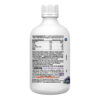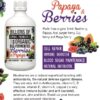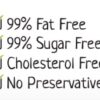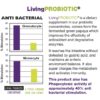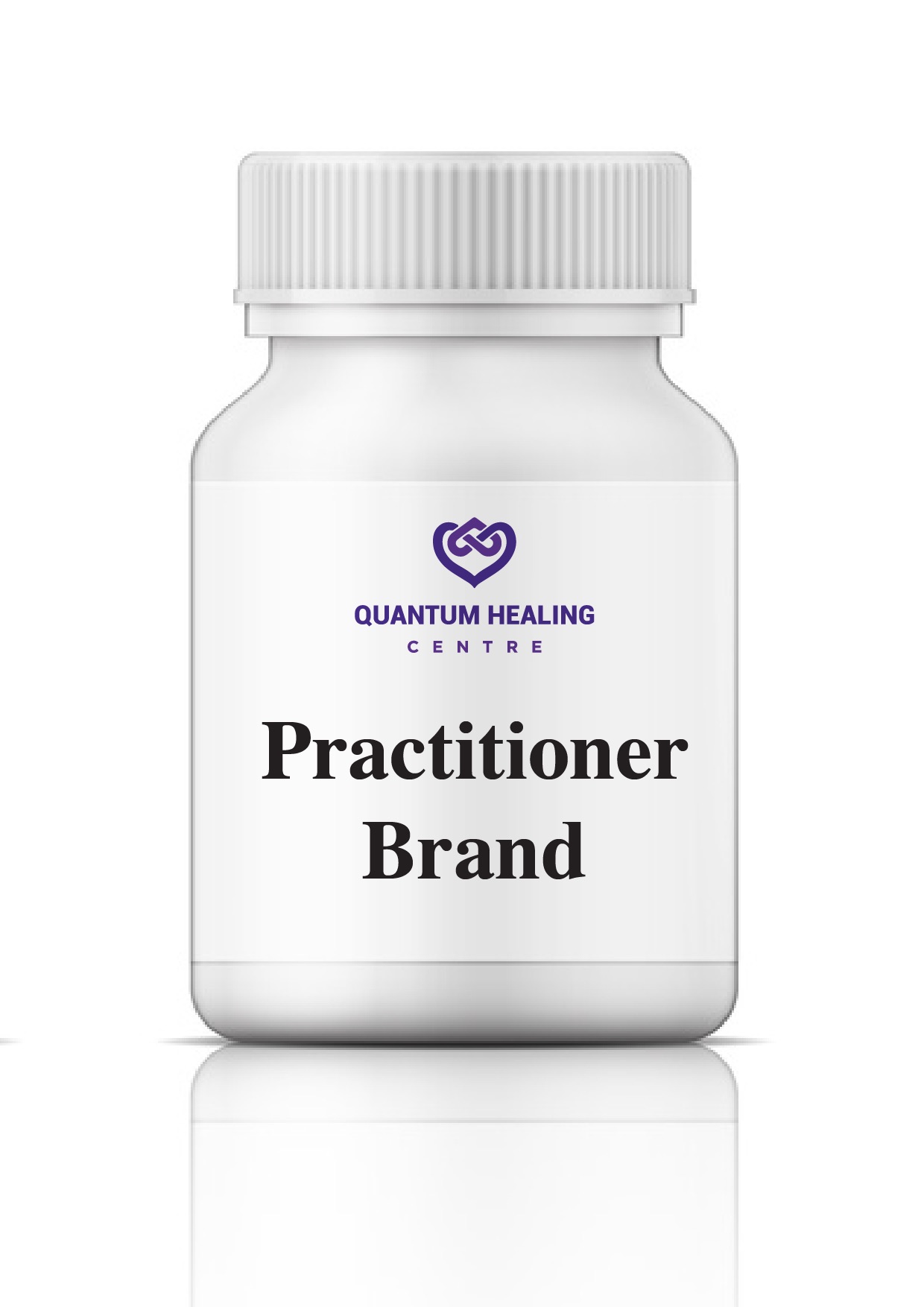Billions of Living Probiotic from 100% Organic Bio-Fermented Berries and Papaya
Original price was: $35.00.$33.00Current price is: $33.00.
Billions of Living Probiotic from 100% Organic Bio-Fermented fresh Blueberry, papapaya fruit, Acai purple berry, Goji berry, Maqui berry of equal amounts. For Cell Repair, Immune Booster, Blood Sugar Maintenance and Natural Anti-biotic.
Description
 Bio-Fermented Berries and Papaya LIQUID
Bio-Fermented Berries and Papaya LIQUID
Bio-Fermented Berries and Papaya, and Living Probiotic Formula and Bio-Fermented Papaya Leaf and Fruit Extract.
100% Organic bio-fermented /probiotic fruit concentrate. Made from fresh Blueberry, papapaya fruit, Acai purple berry, Goji berry, Maqui berry of equal amounts (33 concentrated servings)
Inflammation and poor gut health are two of the leading causes of disease today. You probably already know that certain types of bacteria live inside your body – good and bad. The good bacteria help in the processes of fighting off infections and keeping your organs healthy. These types of “good” bacteria are called probiotics.
500ml of Bio-Fermented Berries and Papaya
Ready to reap the benefits of Bio-Fermented Berries and Papaya? Are you ready to restore digestive balance and maintain intestinal health? Do you need help with relieving symptoms of bloating, gas and flatulence or simply support a normal healthy immune system, then look no further.
Naturally rich in Lactobacillus, Acidophilus and Enzymes, Probiotics are live bacteria and yeasts that are good for your health, especially your digestive system. We usually think of bacteria as something that causes disease. But your body is full of bacteria, both good and bad. Probiotics are often called “good” or “helpful” bacteria because they help keep your gut healthy.
This product also includes bio-fermented papaya leaf and fruit extract which supports a healthy digestive system. Bio-fermented papaya fruit and leaf extract is one of the strongest and most concentrated immune boosting foods available.
Ingredients: 100%bio-fermented /probiotic fruit concentrate. Made from fresh Blueberry, papapaya fruit, Acai purple berry, Goji berry, Maqui berry of equal amounts and Papaya leaf extract.
The above ingredients are processed in a probiotic fermentation plant that ultimately changes the structure of the ingredients that create a complex mix of highly available bioactive compounds.
Made from 100% natural ingredients, without the use of herbicides, pesticides or chemical fertilisers. No artificial preservatives, colourings, stabilisers or food acids added.

- This 500ml liquid concentrate will make up to 8 Litres
- 33 concentrated servings. Note: a jelly substance or sediment from the probiotic may appear. This is normal and can be consumed.
- Each 15ml Contains the goodness of 6 Billion good bacteria by NKCA value compared to a 25 Billion pure Probiotic
- Serving Suggestions: Mix 10-15 ml with up to 200ml sparkling/ filtered water for the optimum refreshing probiotic drink.
Probiotics Benefits Begin in the Gut
 The first and most overlooked reason that our digestive tracts are critical to our health is because 80 percent of your entire immune system is located in your digestive tract! That is an astounding percentage.
The first and most overlooked reason that our digestive tracts are critical to our health is because 80 percent of your entire immune system is located in your digestive tract! That is an astounding percentage.
In addition to the impact on our immune systems, our digestive systems are the second largest part of our neurological system. It’s called the enteric nervous system and is located in the gut. This is why it’s called our second brain!
Many people with health issues, such as thyroid imbalances, chronic fatigue, joint pain, psoriasis, autism and many other conditions don’t realize that these illnesses originate in the gut.
If these issues and many others are connected to our gut health, then what elements are essential for digestive health? Consider this: According to the National Institute of Diabetes and Digestive and Kidney Diseases, upward of 60 million to 70 million Americans are affected by digestive diseases. In addition, digestive disease and disorders cost the U.S. over $100 billion per year.”
These statistics are staggering, yet poor gut health actually affects much greater numbers than these statistics illustrate. That’s because your digestive health affects every physiological system in your body.
The many toxins we’re subjected to today decrease digestive function, affecting our ability to utilize nutrients and rid ourselves of cholesterol, triggering chronic inflammation in the body, which is the cause of many chronic conditions and diseases.
The secret to restoring your digestive health is all about balancing out the good and bad bacteria in your gut. If you’re going to be healthy, you MUST consider consuming probiotic-rich foods and supplements daily.
What Are Probiotics?
Probiotics are bacteria that line your digestive tract and support your body’s ability to absorb nutrients and fight infection. There are actually 10 times  more probiotics in your gut then cells in your body!
more probiotics in your gut then cells in your body!
Your skin and digestive system by themselves host about 2,000 different types of bacteria. Probiotics benefits have been proven effective in supporting immune function and healthy digestion, as well as beautiful skin.
Your good gut bacteria is also responsible for:
- Producing vitamin B12, butyrate and vitamin K2
- Crowding out bad bacteria, yeast and fungi
- Creating enzymes that destroy harmful bacteria
- Stimulating secretion of IgA and regulatory T-cells
Probiotics have been in our systems right from the moment that we stepped into the world. When a newborn is in the birth canal of the mother during delivery, that’s when the baby is exposed to the bacteria of his or her mother for the first time. This event starts a chain of events inside the baby’s GI tract, and the infant’s GI tract starts to produce good bacteria.
If you don’t have enough probiotics, the side effects can include digestive disorders, skin issues, candida, autoimmune disease, and frequent colds and flus.
Historically, we had plenty of probiotics in our diets from eating fresh foods from good soil and by fermenting our foods to keep them from spoiling.
However, because of refrigeration and dangerous agricultural practices like soaking our foods with chlorine, our food contains little to no probiotics today, and most foods actually contain dangerous antibiotics that kill off the good bacteria in our bodies.
By adding more probiotic foods into your diet, you could see all of the following probiotics benefits:
- Stronger immune system
- Improved digestion
- Increased energy from production of vitamin B12
- Better breath because probiotics destroy candida
- Healthier skin, since probiotics naturally treat eczema and psoriasis
- Reduced cold and flu
- Healing from leaky gut syndrome and inflammatory bowel disease
- Weight loss
Top 7 Probiotic Killers
Most people, including children, are in need of a probiotic boost due to the use of prescription medication, particularly antibiotics, as well as high-carbohydrate diets, the consumption of chlorinated and fluoridated water, and conventional foods, such as non-organic meat and dairy that contain antibiotic residues. These chemicals kill off probiotics in your system, which over time damages your digestive tract. (2)
Here are the top seven probiotic killers that can prevent your body from getting all the tremendous probiotics benefits it needs:
- Prescription antibiotics
- Sugar
- Tap water
- GMO foods
- Grains
- Emotional stress
- Chemicals and medications
In order to improve your gut flora balance, make sure to avoid the probiotic killers. We’re exposed to many of these foods, toxins and stressors on a daily basis, and if you’re going to restore your digestive health, they must be addressed. If they’re not addressed, your gut micro-organisms become imbalanced, and your system can become a breeding ground for bad bacteria, yeast, viruses, fungi and parasites. (3)
The only way to fix this issue and heal your gut is to eliminate the foods that feed bad bacteria and start consuming probiotic-rich foods and supplements so probiotics benefits can work their magic.
20 Probiotics Benefits Proven by Research
The strongest evidence to date finds that probiotics benefits include:
- boosting immune system

- preventing and treating urinary tract infections
- improving digestive function
- healing inflammatory bowel conditions like IBS (4)
- managing and preventing eczema in children
- fighting food-borne illnesses
New studies underway may soon prove that probiotics can:
- reduce flu and colds
- reduce overuse of antibiotics
- treat kidney stones
- treat colic
- prevent cavities and gum disease
- treat colitis and Crohn’s disease
- combat antibiotic-resistant bacteria
- treat liver disease
- battle cancer (5)
- manage autism
- lower cholesterol
- fight bacteria that causes ulcers
- improve acne
- lose weight
How Probiotics Work
Your gut contains both beneficial and harmful bacteria. Digestive experts agree that the balance of gut flora should be approximately 85 percent good bacteria and 15 percent bad bacteria.
If this ratio gets out of balance, the condition is known as dysbiosis, which means there’s an imbalance of too much of a certain type of fungus, yeast or bacteria that affects the body in a negative way. By consuming certain types of probiotics foods and supplements, you can help bring these ratios back into balance.

Also, it’s important to understand that probiotics are not a new idea. Throughout history, cultures have thrived on probiotics found in fermented foods and cultured foods, which were invented for food preservation long before the refrigerator.
In fact, the refrigerator could be one of the worst inventions for you digestive health because now we don’t have to culture or ferment our foods to keep them from spoiling so we lose out on those vital probiotics and probiotics benefits.

Beneficial Probiotic Strains
- Bifidobacterium bifidum — the most dominant probiotic in infants and in the large intestine, supports production of vitamins in gut, inhibits harmful bacteria, supports immune system response and prevents diarrhea. (6)
- Bifidobacterium longum — supports liver function, reduces inflammation, removes lead and heavy metals. (7)
- Bifidobacterium breve — helps colonize healthy gut community and crowd out bad bacteria. (8)
- Bifidobacterium infantis — alleviates IBS symptoms, diarrhea and constipation. (9)
- Lactobacillus casei — supports immunity, inhibits h. pylori and helps fight infections. (10)
- Lactobacillus acidophilus — relieves gas, bloating, improves lactose intolerance. Shown to help with a 61 percent reduction in E. coli, lower cholesterol levels and creation of vitamin K. (11) Also, important in GALT immune strength.
- Lactobacillus bulgaricus — a powerful probiotic strain that has been shown to fight harmful bacteria that invades your digestive system and is stable enough to withstand the acidic digestive juices of the stomach. It also neutralizes toxins and naturally produces its own antibiotics.
- Lactobacillus brevis — shown to survive the GI tract, boost cellular immunity, enhanced natural T-killer cells and kill h. pylori bacteria. (12)
- Lactobacillus rhamnosus — supports bacterial balance and supports healthy skin, helps fight urinary tract infections, respiratory infections, and reduce anxiety by reducing stress hormones and GABA neurotransmitter receptors. (13) Also, survives GI tract.
- Bacillus subtilis — an endospore probiotic that’s heat-resistant. Elicits a potent immune response and supports GALT. (14, 15) Suppresses growth of bad bacteria like salmonella and other pathogens.
- Bacillus coagulans — an endospore probiotic that’s heat-resistant and improves nutrient absorption. Also has been shown to reduce inflammation and symptoms of arthritis. (16)
- Saccharomyces boulardii — a yeast probiotic strain that restores natural flora in the large and small intestine and improves intestinal cell growth. It’s proved effective in treating inflammatory bowel disease like Crohn’s disease. (17) It’s been shown to have anti-toxin effects, be antimicrobial and reduce inflammation. (18, 19)
How Immunity Is Improved with Probiotics
Probiotics play a role in defining and maintaining the delicate balance between necessary and excessive defense mechanisms. The immune response is initiated when the body is exposed to foreign substances or a tissue injury. The immune system exerts a protective role as it tries to maintain homeostasis, and when the body senses a threat, it triggers adaptive immune responses that cause inflammation. It’s when there’s an unbalanced immune response that severe inflammation, uncontrolled tissue damage and disease develop.
According to research published in Immunobiology: The Immune System in Health and Disease, the immune system can be viewed as an organ that’s distributed throughout the body to defend us against pathogens, wherever they may enter or spread. Within the immune system, a series of distinct compartments can be distinguished, and each has the ability to generate a response to pathogens present in that particular set of body tissues.
The mucosal immune system includes the permeable surfaces of the body — the eyes, nose, mouth, throat, lungs, uterus, vagina and, the most important area for the discussion of probiotics, the gut. The gut acts as a portal of entry to a vast array of foreign antigens in the form of food, and the gut is heavily colonized by beneficial microorganisms that protect us against pathogenic bacteria by occupying the ecological niches for bacteria in the gut. (20)
Our mucosal immune system plays a significant role in maintaining intestinal homeostasis and causing systematic protective responses. Large amounts of antigens pass through the gut daily, and 100 trillion bacteria are associated with the gastrointestinal tract. This rich gut microbial community is referred to as the microbiome, which plays a vital role in the immune system. Current research indicates that microbial imbalance is associated with broad diseases that are not restricted to the gastrointestinal tract. Researchers have proved that probiotics are a powerful therapeutic strategy for manipulating our microbial composition and immune responses. Certain species of bacteria can have large effects on the gut immune system, and the balance of good and bad bacteria is necessary for the maintenance of homeostasis. (21)
This is why manipulating the microbiome is an alternative approach for maintaining health and preventing or treating diseases. According to research published in Current Opinion in Gastroenterology, several beneficial effects of probiotics on our intestinal mucosal defense system have been identified. Probiotics work to:
- Act as a barrier, lining the intestinal tract. They block bacterial effects by producing substances that kill bacteria and compete with pathogens and toxins to support the intestinal epithelium (the thin tissue forming the outer layer of the intestines).
- Enhance mucus production so we have a thicker mucus layer, which protects us against invasive bacteria.
- Promote the survival of intestinal epithelial cells that help remove foreign substances.
- Enhance barrier function and stimulate protective responses from intestinal epithelial cells.
- Enhance innate immunity and control pathogen-induced inflammation by secreting protective immunoglobulins and stimulating dendritic cells to make them slightly less responsive and less reactive to bacteria. (22)
Research published in the American Journal of Clinical Nutrition states that many probiotic effects are mediated through immune regulation, particularly through balance control of pro-inflammatory and anti-inflammatory cytokines, or substances that are secreted by cells of the immune system and have an effect on their cells. This is how probiotics alleviate intestinal inflammation, normalize gut dysfunction and down-regulate hypersensitivity reactions. (23)
How to Boost Your Immune System with Probiotics
There are two main steps to increase probiotics and boost your immune system. You need to be careful of things that kill off probiotics. Stay away from the toxicity of tap water that contains fluoride and chlorine, and be careful of taking prescription antibiotic medications, which is the leading cause of probiotics getting wiped out today. The use of antibiotics is destroying the beneficial bacterial flora in our bodies, and pathogenic bacteria are selectively enabled to overgrow internal and external surfaces, leading to illness. (24)
You also want to make sure that you don’t consume too much sugar because it can cause bad bacteria to feed, which actually imbalances the good and bad bacteria in your body. Research shows that the quantity of refined sugar in your diet can significantly influence gut function and the composition of bowel contents, so to let probiotics do their job, you need to reduce your sugar consumption and allow your good bacteria to benefit your immune system. (25)
Consuming more probiotic foods also helps boost your immune system. Probiotic foods and a high-quality supplement help you digest nutrients that promote the detoxification of your colon and balance out the bacteria in your gut.
Are There Probiotic Side Effects?
Probiotic side effects can sometimes include diarrhea if you take too much too fast. You can start off with a smaller amount like one tablespoon of kefir or one probiotic capsule a day and work your way up.
But overall, the side effects of probiotics are nothing but positive, making probiotics benefits all the more sweet.
Final Thoughts on Probiotics Benefits
- Do your best to remove substances that can destroy probiotics, like sugar, grains, GMOs, tap water, antibiotics and emotional stress from your life.
- Consume two servings daily of probiotic-rich foods from the top 10 list to receive probiotics benefits.
- Another way to get all those great probiotics benefits it to take a probiotic supplement that has at the very least 10+ strains of probiotics with at least 15 billion CFUs.


